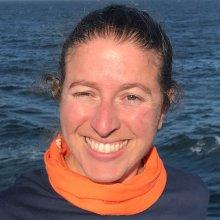
Amanda Kahn
Tell us about your work/research. What kinds of things do you do?
I combine ship-based and laboratory-based research to study how animals that are anchored to the seafloor survive in the food-starved deep sea. These animals cannot get up and move to where there is more food, so they have to deal with seasons of abundance and periods of starvation. Also, every piece of nutritious food is precious because the food is so limited in the deep ocean, so recycling is common. I therefore also study how nutrients are transformed and passed around as they move through the food web. I do this by taking measurements in the deep-sea using underwater robots, by studying the animals in the lab and under a microscope, and by studying chemical tracers such as stable isotopes.
What sparked your initial interest in your career?
I had been interested in marine science for a long time but was constantly encouraged to study something "more practical" by my guidance counselors...so I did for a while in college. Then, at the end of my second year of college, my professor told me about an open house happening at a nearby marine lab. I went to the open house and breathed on a SCUBA regulator for the first time and suddenly the marine world felt so accessible! I signed up to become SCUBA certified, completed the requirements necessary and ended up taking a scientific diving course at that marine lab, which pointed me firmly toward studying marine science. I have not wavered since.
Who influenced you or encouraged you the most?
I've had a lot of fantastic mentors and appreciate all of them, so this is difficult to choose who influenced me the most. So instead, I will say that my earliest influences and encouragement came from my mom and from my peers as a summer camp leader at a local wildlife refuge. My mom told me that I should find something I was passionate about and to always ask if something is possible because "the worst anyone can say is no." So I would ask and apply for all kinds of things, feeling that the worst I could feel was a bit of disappointment at getting turned down for something. The wildlife refuge near my house growing up, the Don Edwards San Francisco Bay National Wildlife Refuge, welcomed me in and I got to meet so many scientists who introduced me to the scientific process and the natural world. I credit them with piquing my interest in science.
What element of your work/study do you think is the most fascinating?
What is most fascinating to me is studying animals that at first glance can look like unmoving, passive lumps on the seafloor...then you realize all that is going on inside of them. I have spent a lot of time studying sponges and they do not look like they are doing much, but if you measure how much water they are filtering through their filter-feeding system, they can have an impressive effect on the water around them!
What other jobs led you to your current career?
I worked a range of jobs. I was an after-school tutor and daycare caretaker during my high school and some college years, which honestly taught me that I loved to teach but did not love to teach young kids long-term. I loved summer camps, was an animal caretaker at my university, worked as a research assistant and lab manager in a research lab while I studied for my master's degree, and also built websites on the side during that time. While the jobs did help me pay my bills, they also gave me great skills that will help me as I continue in my current career trajectory. For instance, website building and design familiarized me with computer languages; being a lab manager helped me learn the day-to-day needs of running a research lab. Also, while it wasn't a paid job, I have been a science blogger off-and-on over the years which has helped me understand how to communicate science to a variety of ages and backgrounds.
What are your degrees and certifications?
Bachelor of Science in Biology, Bachelor of Arts in Chemistry - California State University, East Bay 2007; Masters of Science in Marine Science - Moss Landing Marine Laboratories/California State University, Monterey Bay 2010; Ph.D. Ecology, University of Alberta, 2016. I am also a SCUBA certified scientific diver.
What are your hobbies?
I love to exercise - I am an avid trail runner, hiker, and martial artist...and while I don't live near a tribe right now, I am a big fan of November Project. I also SCUBA dive for fun, play the piano and ukulele and like to take my cat Romeo out for walks on a leash.
What advice would you give someone who wants to have a career like yours?
I'll pass along my mom's great advice: it really doesn't hurt to ask for things, so ask how you can get involved with something, contact someone to find out if there are ways to join in on an interesting adventure, apply for things you don't know if you can get...because the worst they can say is no and the best that can happen is that you get to try new things and get involved to explore your interests.
How did you get involved with the Nautilus Exploration Program?
I was out at sea with someone who told me about this Nautilus expedition. The types of animals I study - corals, sponges, etc. - live on seamounts so I am very excited to see the seamount that we will visit on this cruise.
Expeditions
Amanda participated in the following Ocean Exploration Trust expeditions:
